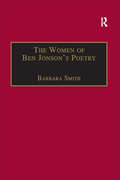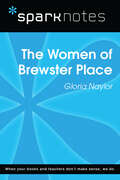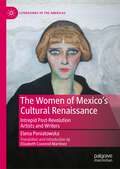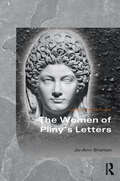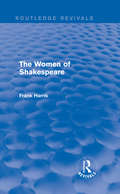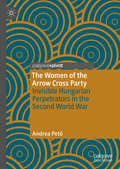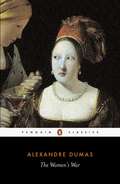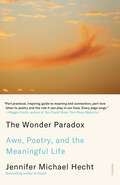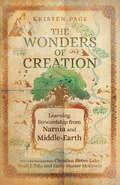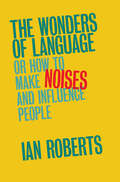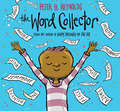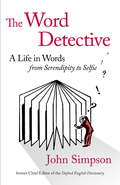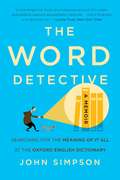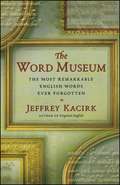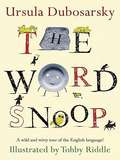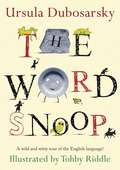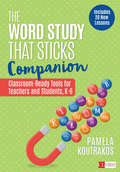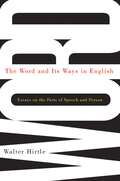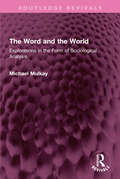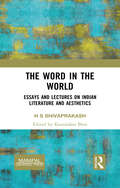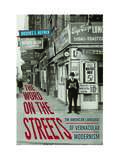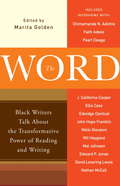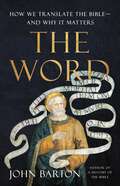- Table View
- List View
The Women of Ben Jonson's Poetry: Female Representations in the Non-Dramatic Verse
by Barbara SmithBen Jonson (1572-1637) is recognised as one of the major poets and dramatists of his time. It is surprising, therefore, that this should be the first study to look specifically at the role of women in his poetry. Barbara Smith challenges previously held conceptions of Jonson as a misogynist, upholding the patronage system that allowed him to work. Through detailed examination of his poetic structures, the influence of Juvenal, Martial and Horace, and Jonson's attitudes to his own female patrons, the Countess of Bedford and Lady Mary Wroth, The Women of Ben Jonson's Poetry demonstrates how seventeenth century cultural values and ideas of gender are both supported and subverted in the poems. ’If we "survey Jonson in his works and know him there", we will find the independence of spirit and originality that made him a rarity in his time and ours.'
The Women of Brewster Place (SparkNotes Literature Guide Series)
by SparkNotesThe Women of Brewster Place (SparkNotes Literature Guide) by Gloria Naylor Making the reading experience fun! Created by Harvard students for students everywhere, SparkNotes is a new breed of study guide: smarter, better, faster. Geared to what today's students need to know, SparkNotes provides: *Chapter-by-chapter analysis *Explanations of key themes, motifs, and symbols *A review quiz and essay topicsLively and accessible, these guides are perfect for late-night studying and writing papers
The Women of Mexico's Cultural Renaissance: Intrepid Post-Revolution Artists and Writers (Literatures of the Americas)
by Elena Poniatowska Elizabeth Coonrod MartínezThis book consists of a collection of essays by Mexican writer Elena Poniatowska in their first English translation, and a critical introduction. The highly engaging essays explore the lives of seven transformational figures for Mexican feminism. This includes Frida Kahlo, Maria Izquierdo, and Nahui Olin, three outstanding artists of the cultural renaissance of the early twentieth century, and Nellie Campobello, Elena Garro, Rosario Castellanos, and Pita Amor, forerunner writers and poets whose works laid a path for Mexican women writers in the later twentieth century. Poniatowska’s essays discuss their fervent activity, interactions with other prominent figures, details and intricacies about their specific works, their scandalous and irreverent activities to draw attention to their craft, and specific revelations about their lives. The extensive critical introduction surveys the early feminist movement and Mexican cultural history, explores how Mexico became a more closed society by the mid-twentieth century, and suggests further reading and films. This book will be of interest both to the general reader and to scholars interested in feminist/gender studies, Mexican literary and cultural studies, Latin American women writers, the cultural renaissance, translation, and film studies.
The Women of Pliny's Letters (Women of the Ancient World)
by Jo-Ann SheltonPliny's letters offer a significant source of information about the lives of Roman women (predominantly, though not exclusively, upper-class women) during the late first and early second centuries CE. In the 368 letters included in his ten published books of epistles, Pliny mentions over 30 women by name, addresses letters to seven, and refers to well over 40 anonymous women. Many of the references are brief comments in letters whose topics are the activities of Pliny's male acquaintances. Nonetheless his letters inform us about the roles of women in Roman families, marriages, and households, and also record the involvement of women in such matters as court cases, property ownership, religious orders, social networks, and political activities. This book has two aims. The first is to bring these women to the foreground, to explore their kinships, relationships, and activities, and to illuminate their lives by viewing them in the social, cultural, and political environments of the period in which they lived. This book utilizes historical, literary, legal, and epigraphical sources to examine the events, circumstances, and attitudes that were the contexts for the lives of these women. The first aim, then, is to gain insight into the reality of their lives. The second aim of this book is to investigate how Pliny defines the ideal behavior for women. In his accounts of the actions of both women and men, Pliny frequently shapes his narratives to promote moral lessons. In several of his letters about women, he elevates his subject to the status of a role model. The second aim of this book is to use the descriptions provided by Pliny to acquire a better understanding of what behavior was admired in Roman women of this period, and to consider how the concept of the model Roman woman is constructed in Pliny.
The Women of Shakespeare (Routledge Revivals)
by Frank HarrisFrank Harris argues that the way women are presented in Shakespeare’s plays and sonnets are a reflection of the real-life women in his life, namely his wife, mother, mistress and daughter. Originally published in 1911, The Women of Shakespeare also analyses the traditional criticism of the time and places his own views in this context. This title will be of interest to students of English Literature.
The Women of the Arrow Cross Party: Invisible Hungarian Perpetrators in the Second World War
by Andrea PetőThis book analyses the actions, background, connections and the eventual trials of Hungarian female perpetrators in the Second World War through the concept of invisibility. It examines why and how far-right women in general and among them several Second World War perpetrators were made invisible by their fellow Arrow Cross Party members in the 1930s and during the war (1939-1945), and later by the Hungarian people’s tribunals responsible for the purge of those guilty of war crimes (1945-1949). It argues that because of their ‘invisibilization’ the legacy of these women could remain alive throughout the years of state socialism and that, furthermore, this legacy has actively contributed to the recent insurgence of far-right politics in Hungary. This book therefore analyses how the invisibility of Second World War perpetrators is connected to twenty-first century memory politics and the present-day resurgence of far-right movements.
The Women's War
by Alexandre DumasThe Baron des Canolles is a man torn apart by the civil war that dominates mid-seventeenth century France. For while the naïve Gascon soldier cares little for the politics behind the battles, he is torn apart by a deep passion for two powerful women on opposing sides of the war: Nanon de Lartigues, a keen supporter of the Queen Regent Anne of Austria, and the Victomtesse de Cambes, who supports the rebellious forces of the Princess de Condé. Set around Bordeaux during the first turbulent years of the reign of Louis XIV, The Women's War sees two women taking central stage in a battle for all France. Humorous, dramatic and romantic, it offers a compelling exploration of political intrigue, the power of redemption, the force of love and the futility of war.
The Wonder Paradox: Awe, Poetry, and the Meaningful Life
by Jennifer Michael HechtThe Wonder Paradox offers a lively, practical, and transcendent road map to meaning and connection through poetry.Where do we find magic? Peace? Connection?We have calendars to mark time, communal spaces to bring us together, bells to signal hours of contemplation, official archives to record legacies, the wisdom of sages read aloud, weekly, to map out the right way to live—in kindness, justice, morality. These rhythms and structures of society were all once set by religion. Now, for many, religion no longer runs the show.So how then to celebrate milestones? Find rules to guide us? Figure out which texts can focus our attention but still offer space for inquiry, communion, and the chance to dwell for a dazzling instant in what can’t be said? Where, really, are truth and beauty? The answer, says The Wonder Paradox, is in poetry.In twenty chapters built from years of questions and conversations with those looking for an authentic and meaningful life, Jennifer Michael Hecht offers ways to mine and adapt the useful aspects of tradition and to replace what no longer feels true. Through cultures and poetic wisdom from around the world—Sappho, Rumi, Shakespeare, Issa, Tagore, Frost, Szymborska, Angelou, and others—she blends literary criticism with spiritual guidance rooted in the everyday. Linking our needs to particular poems, she helps us better understand those needs, our very being, and poetry itself.Our capacity for wonder is one of the greatest joys of being human; The Wonder Paradox celebrates that instinct and that yearning.
The Wonders of Creation: Learning Stewardship from Narnia and Middle-Earth (Hansen Lectureship Series)
by Kristen PageWhen an author of fiction employs the imagination and sets characters in a new location, they are in a sense creating a world. Might such fictional worlds give us a deeper appreciation for our own?Many readers have found themselves, like the Pevensie children, transported by C. S. Lewis into Narnia, and they have traveled from Lantern Waste to Cair Paravel and the edge of the sea. Thanks to J. R. R. Tolkien, readers have also journeyed with Bilbo, Frodo, and their companions across Middle-earth from the Shire to the Lonely Mountain, the forest of Mirkwood, the mines of Moria, and the very fires of Mount Doom. But as often as we enter these fictional worlds as readers, we eventually return to our world refreshed with sharpened insight.The Wonders of CreationBased on the annual lecture series hosted at Wheaton College's Marion E. Wade Center, volumes in the Hansen Lectureship Series reflect on the imaginative work and lasting influence of seven British authors: Owen Barfield, G. K. Chesterton, C. S. Lewis, George MacDonald, Dorothy L. Sayers, J. R. R. Tolkien, and Charles Williams.
The Wonders of Language
by Ian RobertsIan Roberts offers a stimulating introduction to our greatest gift as a species: our capacity for articulate language. We are mostly as blissfully unaware of the intricacies of the structure of language as fish are of the water they swim in. We live in a mental ocean of nouns, verbs, quantifiers, morphemes, vowels and other rich, strange and deeply fascinating linguistic objects. This book introduces the reader to this amazing world. Offering a thought-provoking and accessible introduction to the main discoveries and theories about language, the book is aimed at general readers and undergraduates who are curious about linguistics and language. Written in a lively and direct style, technical terms are carefully introduced and explained and the book includes a full glossary. The book covers all the central areas of linguistics, including phonetics, phonology, morphology, syntax, semantics and pragmatics, as well as historical linguistics, sociolinguistics and psycholinguistics.
The Word Collector
by Peter H. ReynoldsFrom the beloved bestselling creator of The Dot and our own Happy Dreamer comes an inspiring story about the transformative and profound power of words.Some people collect stamps.Some people collect coins.Some people collect art.And Jerome?Jerome collected words . . . In this extraordinary new tale from Peter H. Reynolds, Jerome discovers the magic of the words all around him -- short and sweet words, two-syllable treats, and multisyllable words that sound like little songs. Words that connect, transform, and empower. From the creator of The Dot and Happy Dreamer comes a celebration of finding your own words -- and the impact you can have when you share them with the world.
The Word Detective: A Life in Words: From Serendipity to Selfie
by John SimpsonLanguage is always changing. No one knows where it is going but the best way to future-cast is to look at the past. John Simpson animates for us a tradition of researching and editing, showing us both the technical lexicography needed to understand a word, and the careful poetry needed to construct its definition. He challenges both the idea that dictionaries are definitive, and the notion that language is falling apart. With a sense of humour, an ability to laugh at bureaucracy and an inclination to question the status quo, John Simpson gives life to the colourful characters at the OED and to the English language itself. He splices his stories with entertaining and erudite diversions into the history and origin of words such as 'kangaroo', 'hot-dog' , 'pommie', 'bicycle' , not ignoring those swearwords often classed as 'Anglo-Saxon' ! The book will speak to anyone who uses a dictionary, 'word people' , history lovers, students and parents.
The Word Detective: Searching for the Meaning of It All at the Oxford English Dictionary
by John Simpson"A charmingly full, frank, and humorous account of a career dedicated to rigorous lexicographic rectitude. . . . He is an absolute hero."-Lynne Truss, New York TimesCan you drink a glass of balderdash? And what do you call the part of a dog's back it can't scratch? The answers to these questions can be found in the Oxford English Dictionary. There is no better guide to the dictionary's many wonderments than its former chief editor, John Simpson. In The Word Detective, an intensely personal memoir and a joyful celebration of English, he weaves a story of how words come into being, how culture shapes language, and how technology transforms words. A brilliant and deeply humane expedition through the world of words, The Word Detective will delight and inspire any lover of language.
The Word Museum
by Jeffrey KacirkENTER A GALLERY OF WIT AND WHIMSY As the largest and most dynamic collection of words ever assembled, the English language continues to expand. But as hundreds of new words are added annually, older ones are sacrificed. Now from the author of Forgotten English comes a collection of fascinating archaic words and phrases, providing an enticing glimpse into the past. With beguiling period illustrations, The Word Museum offers up the marvelous oddities and peculiar enchantments of old and unusual words.
The Word Snoop
by Ursula Dubosarsky Tohby RiddleMeet the Word Snoop. She?s dashing and daring and witty as can be?and no one knows more about the evolution of the English language than she does. Luckily, she?s spilling her secrets in this gem of a book. From the first alphabet in 4000 BC, to anagrams, palindromes, and modern-day text messages, readers will learn all about the fascinating twists and turns our fair language has taken to become what it is today. With playful black-and-white illustrations, riddles to solve, and codes to break, The Word Snoop is definitive proof that words can spark the imagination and are anything but dull. This is a book for every aspiring writer, and every true reader.
The Word Snoop
by Ursula DubosarskyMeet the Word Snoop. She's dashing and daring and witty as can be -- and no one knows more about the evolution of the English language than she does. Luckily, she's spilling her secrets in this gem of a book. From the first alphabet in 4000 BC, to anagrams, palindromes, and modern-day text messages, readers will learn all about the fascinating twists and turns our fair language has taken to become what it is today. With playful black-and-white illustrations, riddles to solve, and codes to break, The Word Snoop is definitive proof that words can spark the imagination and are anything but dull. This is a book for every aspiring writer, and every true reader.
The Word Study That Sticks Companion: Classroom-Ready Tools for Teachers and Students, Grades K-6 (Corwin Literacy)
by Pamela A. KoutrakosFirst Pamela Koutrakos delivered a systematic approach to inquiry-based, student-centered, and joyful word study in her book Word Study That Sticks. Now, in The Word Study That Sticks Companion, Koutrakos offers tools and resources to help teachers put those structures, lessons, and routines into action. Loaded with teacher-facing resources such as planning and assessment tools, and student-facing tools such as reproducible minicharts, choice checklists, and self-assessments, The Word Study That Sticks Companion includes Ready-to-go materials that greatly minimize the time teachers spend preparing, creating, and revamping word study lessons More than 100 student-friendly, reproducible minicharts for student notebooks that summarize the routines in each area of word study and support robust word learning Twenty brand-new word study lessons to extend the learning throughout the year and across content areas Ideas for word study notebooks and choice charts that give students ownership of daily practice Suggestions for replicating many routines and tools in a digital format Customizable cycle schedules, checklists, look-fors, planning guides, record-keeping forms, and other tools that help teachers crystalize priorities, organize instruction, and adapt for all learners The routines and resources here can be used within any curriculum, as they transcend any one program, philosophy, or approach to word study. The Word Study That Sticks Companion enables consistent, authentic, and independent word study practice in K–6 classrooms. With these materials in hand, students can take charge of their learning, and teachers gain more time for differentiated instruction. Discover what’s possible when you ditch word study worksheets and workbooks once and for all!
The Word Study That Sticks Companion: Classroom-Ready Tools for Teachers and Students, Grades K-6 (Corwin Literacy)
by Pamela A. KoutrakosFirst Pamela Koutrakos delivered a systematic approach to inquiry-based, student-centered, and joyful word study in her book Word Study That Sticks. Now, in The Word Study That Sticks Companion, Koutrakos offers tools and resources to help teachers put those structures, lessons, and routines into action. Loaded with teacher-facing resources such as planning and assessment tools, and student-facing tools such as reproducible minicharts, choice checklists, and self-assessments, The Word Study That Sticks Companion includes Ready-to-go materials that greatly minimize the time teachers spend preparing, creating, and revamping word study lessons More than 100 student-friendly, reproducible minicharts for student notebooks that summarize the routines in each area of word study and support robust word learning Twenty brand-new word study lessons to extend the learning throughout the year and across content areas Ideas for word study notebooks and choice charts that give students ownership of daily practice Suggestions for replicating many routines and tools in a digital format Customizable cycle schedules, checklists, look-fors, planning guides, record-keeping forms, and other tools that help teachers crystalize priorities, organize instruction, and adapt for all learners The routines and resources here can be used within any curriculum, as they transcend any one program, philosophy, or approach to word study. The Word Study That Sticks Companion enables consistent, authentic, and independent word study practice in K–6 classrooms. With these materials in hand, students can take charge of their learning, and teachers gain more time for differentiated instruction. Discover what’s possible when you ditch word study worksheets and workbooks once and for all!
The Word and Its Ways in English: Essays on the Parts of Speech and Person
by Walter HirtleAn exploration of how the mind creates words and, in turn, how words represent intended meanings.
The Word and the World: Explorations in the Form of Sociological Analysis (Routledge Revivals)
by Michael MulkayFirst published in 1985, The Word and the World is a significant, empirically-based contribution to the sociological analysis of scientists’ discourse and scientific culture. It also offers a radical departure from established forms of sociological discourse which has far-reaching implications for all areas of sociological study. The central aim of this book is to widen the range of textual forms used in empirical sociological research, and thereby to increase sociologists’ ability to furnish interesting, valid and practically useful conclusions. The unusual textual forms employed for the purposes of sociological analysis are ‘the play’, ‘the investigative inquiry’, ‘the participant-analyst dialogue’, and ‘the parody’. One of the main substantive topics that provides the material for these explorations in form is the ‘scientific debate’. This book will be of interest to students of sociology, rhetoric, linguistics and science.
The Word in the World: Essays and Lectures on Indian Literature and Aesthetics
by H S ShivaprakashThe Word in the World is a collection of essays and lectures by H S Shivaprakash, a well-known poet, playwright, and translator. Edited by Kamalakar Bhat, this book brings together Prof Shivaprakash’s interventions in the realm of issues that are entwined with the continuities and discontinuities in the cultural negotiations of India. Distinctively, these are essays on subjects ranging from the nature and significance of medieval works of literature in India to issues arising out of developments in Indian aesthetics. The unfeigned magnitude of this work must be found among students and scholars, who will gain from it a perspective significantly different from the ones available in the prevailing academic discourses, thus indicating a way beyond poststructuralist/postmodernist frameworks. This is a book that will interest a wide variety of readers with its engaging insights and breadth of reference especially because it is written in a comprehensible style. Print edition not for sale in South Asia (India, Sri Lanka, Nepal, Bangladesh, Pakistan and Bhutan)
The Word on the Streets: The American Language of Vernacular Modernism
by Brooks E. HefnerFrom the hard-boiled detective stories of Dashiell Hammett to the novels of Claude McKay, The Word on the Streets examines a group of writers whose experimentation with the vernacular argues for a rethinking of American modernism—one that cuts across traditional boundaries of class, race, and ethnicity.The dawn of the modernist era witnessed a transformation of popular writing that demonstrated an experimental practice rooted in the language of the streets. Emerging alongside more recognized strands of literary modernism, the vernacular modernism these writers exhibited lays bare the aesthetic experiments inherent in American working-class and ethnic language, forging an alternative pathway for American modernist practice.Brooks Hefner shows how writers across a variety of popular genres—from Gertrude Stein and William Faulkner to humorist Anita Loos and ethnic memoirist Anzia Yezierska—employed street slang to mount their own critique of genteel realism and its classist emphasis on dialect hierarchies, the result of which was a form of American experimental writing that resonated powerfully across the American cultural landscape of the 1910s and 1920s.
The Word: Black Writers Talk About the Transformative Power of Reading and Writing
by Marita GoldenCritically acclaimed Black writers reveal how books have shaped their personal lives--in often unexpected ways. In these thirteen strikingly candid interviews, bestselling authors, winners of the Pulitzer Prize, and writers picked by Oprah's Book Club discuss how the acts of reading and writing have deeply affected their lives by expanding the conceptual borders of their communities and broadening their sense of self. Edwidge Danticat movingly recounts the first time she encountered a Black character in a book and how this changed her worldview forever; Edward P. Jones speaks openly about being raised by an illiterate mother; J. California Cooper discusses the spiritual sources of her literary inspiration; Nathan McCall explains how reading saved his life while in prison; Pearl Cleage muses eloquently about how other people's stories help one make one's own way in the world; and world-renowned historian John Hope Franklin--in one of the last interviews he gave before his death--touchingly recalls his childhood in the segregated South and how reading opened his mind to life's greater possibilities. The stories that emerge from these in-depth interviews not only provide an important record of the creative life of leading Black writers but also explore the vast cultural and spiritual benefits of reading and writing, and they support the growing initiative to encourage people to read as both a passion and a pastime.
The Word: How We Translate the Bible—and Why It Matters
by John BartonFrom a distinguished Oxford scholar and the author of A History of the Bible, an examination of how biblical translation works and why it matters Throughout history, most Jewish and Christian believers have understood scripture not in the languages in which it was first written but rather in their own—in translation. In The Word, acclaimed Bible scholar John Barton explores how saints and scholars have negotiated the profound challenges of translating the Bible while remaining faithful to the original. In addition to considering questions of literal versus free translation, literary style, inclusive language, and more, Barton draws out scriptural translation&’s role at critical junctures in religious history. Far from a mere academic exercise, biblical translation has shaped how we answer faith&’s most enduring questions about the nature of God, the existence of the soul, and the possibility of salvation.
